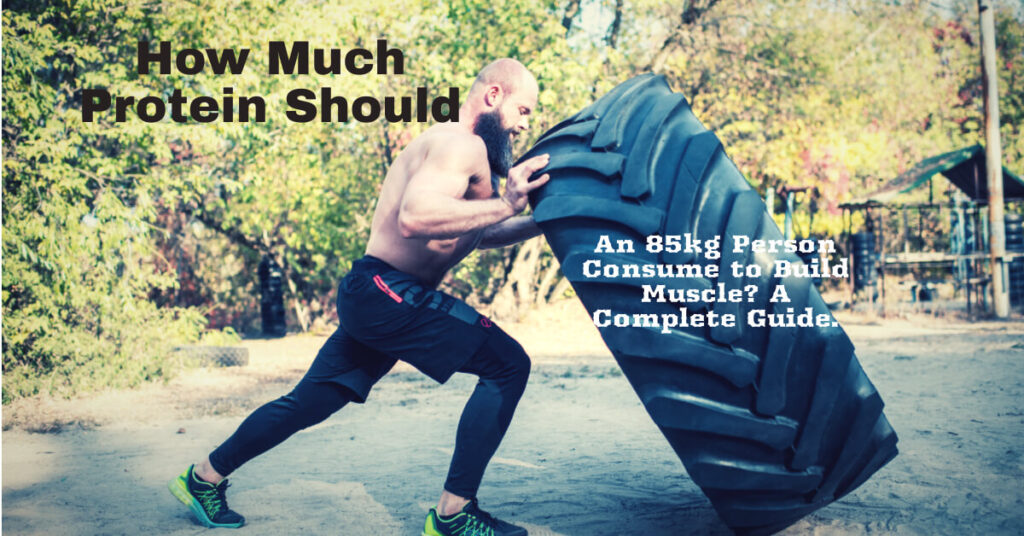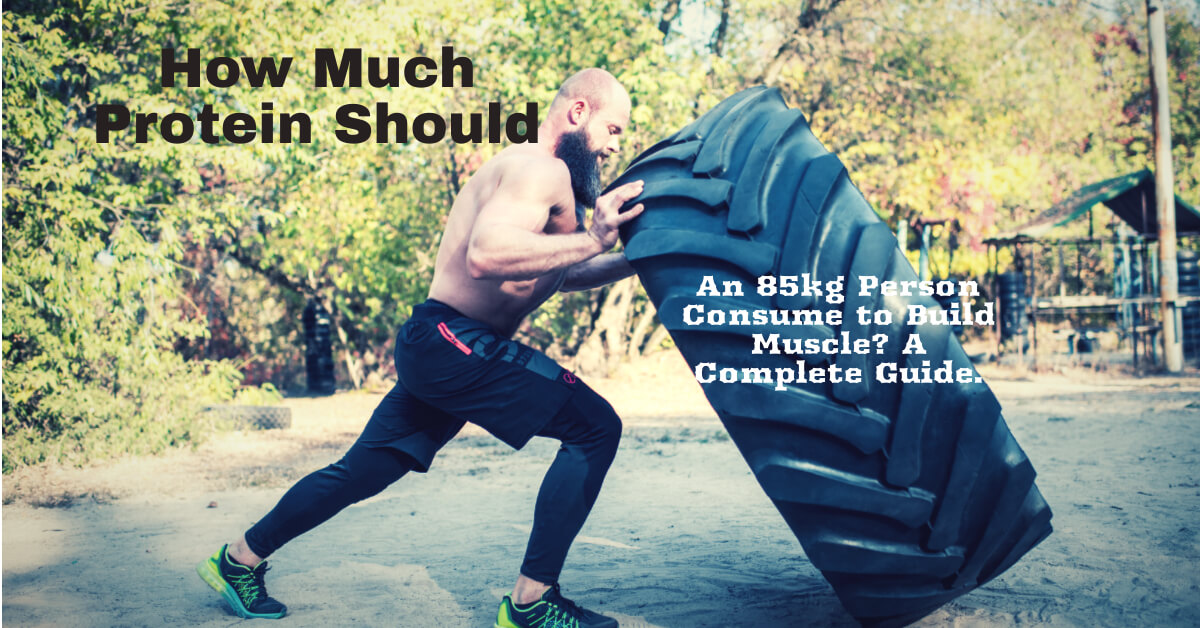“How Much Protein Should an 85kg Person Consume to Build Muscle? A Complete Guide. Building muscle requires more than just lifting weights—it requires proper nutrition, and among the most important nutrients is protein. For an 85kg individual aiming to increase muscle mass, understanding how much protein is necessary to fuel muscle growth is essential. Protein is the building block of muscle tissue, and its intake directly influences muscle recovery, repair, and growth. But how much protein should an 85kg person consume to build muscle? This guide will provide you with a clear, evidence-based answer, and give you strategies to ensure you’re getting enough protein to optimize your muscle-building journey.

Why Protein is Crucial for Muscle Growth
Before diving into how much protein you need, let’s explore why protein is essential for muscle growth. When you engage in resistance training or any form of intense exercise, you create tiny tears in your muscle fibers. Protein, particularly the amino acids found within it, plays a vital role in repairing and rebuilding these muscle fibers. This repair process leads to muscle growth, increased strength, and improved athletic performance.
Protein helps with muscle protein synthesis (MPS), the process by which new muscle tissue is created. Without adequate protein, your body will not be able to effectively repair and grow muscle tissue, which can result in slower progress and reduced muscle mass.
Now, let’s get into the specifics of how much protein an 85kg person should consume to build muscle.
How Much Protein Does an 85kg Person Need to Build Muscle?
The amount of protein required to build muscle varies based on factors such as body weight, activity level, and goals. However, the general guideline for protein intake for muscle building is 1.6 to 2.2 grams of protein per kilogram of body weight. For an 85kg person, this translates into the following protein intake range:
- Lower end (1.6g per kg): 85kg x 1.6g = 136g of protein per day.
- Higher end (2.2g per kg): 85kg x 2.2g = 187g of protein per day.
Therefore, if you weigh 85kg and want to build muscle, you should aim for 136 to 187 grams of protein per day. The exact amount within this range depends on several factors, which we will discuss in the next section.
Factors That Influence Protein Requirements for an 85kg Person
While the 1.6 to 2.2 grams per kilogram range is a helpful starting point, your specific protein needs may vary depending on several factors. Let’s look at what could influence your protein requirements:
- Training Intensity: If you’re engaging in high-intensity resistance training, you will need more protein to repair the muscle damage caused by heavy lifting or intense workouts. The more intense your training, the greater your muscle breakdown, and the more protein your body requires for recovery and growth. If you’re doing moderate or less intense exercise, you can aim for the lower end of the protein intake spectrum.
- Fitness Goals: Your protein needs also depend on your muscle-building goals. If you’re trying to maximize muscle gain and put on significant mass, you will likely need to consume the higher end of the protein range, closer to 2.2 grams per kilogram. On the other hand, if you’re simply trying to maintain muscle while losing fat or improving endurance, you can aim for the lower end of the spectrum.
- Age and Gender: Age can affect how well your body processes protein. Older adults may need slightly more protein to stimulate muscle protein synthesis, as their bodies become less efficient at repairing muscle. Additionally, men typically have more muscle mass than women and, as a result, may need more protein to support muscle growth.
- Body Composition: If you’re leaner with a higher muscle mass percentage, you will likely need more protein to support muscle repair and growth. If you have a higher body fat percentage, your protein needs might be somewhat lower, but you should still aim for adequate intake to preserve muscle mass while reducing fat.
- Metabolism: Individuals with a faster metabolism often require more protein because their bodies burn calories (and muscle) more quickly. If you have a naturally fast metabolism and find it difficult to gain weight or muscle mass, increasing your protein intake can help you support muscle growth.
- Dietary Preferences: If you’re following a plant-based or vegetarian diet, you may need to focus on protein combinations to ensure you’re getting all the essential amino acids necessary for muscle repair and growth. Plant proteins tend to be lower in certain amino acids, so combining sources such as beans and rice or lentils and quinoa can help meet your protein needs.
How to Distribute Protein Intake Throughout the Day
Now that we’ve answered the question, “How much protein does an 85kg person need to build muscle?” it’s important to consider how to distribute your protein intake throughout the day. Consuming protein at regular intervals, rather than in one large meal, has been shown to enhance muscle protein synthesis. This helps keep your muscles in an anabolic (muscle-building) state throughout the day.
Here’s a good strategy to follow:
- Breakfast: Aim for 25-30g of protein. You can include sources like eggs, Greek yogurt, protein oatmeal, or a protein shake.
- Lunch: Target another 30-40g of protein. Chicken breast, turkey, tofu, or quinoa with beans are great options.
- Dinner: Again, aim for 30-40g of protein. Consider fish, lean beef, or a plant-based protein source like lentils or tempeh.
- Snacks: Include a protein-rich snack like a protein bar, cottage cheese, or a handful of nuts. Aim for 10-20g of protein.
Distributing protein in this way ensures your body has a constant supply of amino acids, which is crucial for ongoing muscle repair and growth.
Protein Timing: Does It Matter?
When it comes to muscle-building, timing your protein intake may play a role in maximizing results. Research suggests that consuming protein after your workout—within 30-60 minutes—is especially beneficial for muscle recovery. This post-workout “anabolic window” is when your muscles are most receptive to protein and will use it most efficiently for repair.
However, protein timing should not be your primary focus. What’s more important is your overall daily intake. If you can consistently hit your protein target throughout the day, the timing will have a smaller effect on your overall results.
Best Sources of Protein for an 85kg Person
Whether you prefer animal-based or plant-based protein sources, the key is choosing high-quality proteins that are rich in essential amino acids. Here are some of the best options:
Animal-Based Proteins:
- Chicken and Turkey: Lean meats that provide a high protein-to-calorie ratio.
- Fish: Salmon, tuna, and cod are packed with protein and healthy fats, which aid in muscle recovery.
- Eggs: A complete source of protein, eggs contain all nine essential amino acids and are highly versatile.
- Greek Yogurt and Cottage Cheese: Both are excellent sources of casein protein, which digests slowly and helps with muscle repair overnight.
Plant-Based Proteins:
- Tofu and Tempeh: Both are made from soybeans and contain all the essential amino acids.
- Lentils and Beans: Great sources of plant protein. Combining different types of beans can provide a complete amino acid profile.
- Quinoa: A complete plant protein, quinoa provides all nine essential amino acids.
- Nuts and Seeds: Almonds, chia seeds, and hemp seeds are rich in protein and healthy fats.
If you follow a vegetarian or vegan diet, it’s important to combine different plant protein sources to ensure you’re getting all the amino acids necessary for muscle building.
Should You Use Protein Supplements?
If you’re struggling to meet your daily protein requirements through whole foods alone, protein supplements such as whey protein or plant-based protein powder can help. These supplements are convenient, fast-digesting, and help you reach your daily protein target. However, supplements should complement, not replace, whole food sources of protein.
Whey protein, in particular, is a high-quality protein that digests quickly and is ideal for post-workout recovery. Plant-based protein powders can be just as effective for muscle building and are suitable for vegetarians and vegans.
Conclusion: How Much Protein Does an 85kg Person Need to Build Muscle?
To wrap up, an 85kg individual looking to build muscle should aim for 136 to 187 grams of protein per day. This range of protein intake, based on 1.6 to 2.2 grams of protein per kilogram of body weight, ensures optimal muscle growth and recovery.
To achieve these protein goals, focus on consuming high-quality protein sources throughout the day, ensuring that you distribute your intake across several meals and snacks. Keep in mind that your individual protein needs may vary based on factors like training intensity, age, and metabolism, so be sure to adjust your intake accordingly.
By following these guidelines and staying consistent with your protein intake, you’ll be well on your way to building muscle and achieving your fitness goals.

